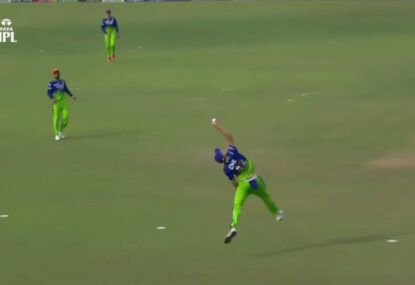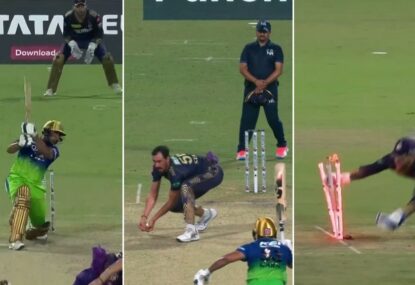The third Test between Pakistan and Australia was won by the visitors, securing them the truly enormous Benaud-Qadir trophy. The BQT is approximately a thousand times as big as the Ashes urn and hence a thousand times as important. Congratulations to Pat Cummins and his team.
Here’s the report card for the third Test.
Fried Umpire Brains
Grade: B-
Cummins won the toss and immediately elected to bat. Australia made 391 with perhaps the highlight of the innings being Alex Carey surviving a decision from umpire Aleem Dar, when he was given out to either an LBW that didn’t hit his pad or a caught behind that didn’t carry to the keeper.
It turned out that – much like in the Ashes, when Ben Stokes was given out off the bowling of Cameron Green – the ball had hit the stump, but not dislodged the bail.
Dar’s original decision was presumably LBW. But then when Carey reviewed, Dar consulted with the square leg umpire and gave a soft signal of out. Which suggested that he, in fact, didn’t think it was an LBW, because those have the grown-up version of soft signals, the umpire’s call. But if it wasn’t LBW, that meant that both umpires hadn’t noticed a ball bouncing well in front of the keeper. And, in fact, were sufficiently confident that it had reached his gloves for the out soft signal. It was only on replay that it was discovered the ball had missed everything other than the stump and the decision was overturned.
To be fair, the corresponding moment in the Ashes had also resulted in a decision that made no sense when worked through carefully. We must therefore assume that a ball hitting the stumps but not dislodging the bails completely fries umpires’ brains.
Fair enough too.
Bails, you have one job.
Fruitless Toiling
Grade: D-
For the early parts of Pakistan’s reply, Australia toiled fruitlessly. Oh, sure, regular edges would fly between Smith and Carey, prompting multiple ignored calls for a halfth slip to be put in. But that was about it.
Much as they’d done all series, Pakistan continued to bat serenely on, as the commentators desperately clung to hope that things might change any moment now.
“Is that ball reversing?”
“I think there’s a little bit of reverse there.”
“Just a touch of reverse, which you’d expect around about now.”
“Maybe some reverse on that delivery.”
The search for barely detectable reverse swing has become my favourite part of Test cricket.
Being In Complete Control Of One’s Own Movement
Grade: C+
And then suddenly the barely detectable reverse swing became wholly detectable, the fruitless toiling became fruitful and the serene Pakistan batting became vastly less so.
Starc castled Fawad Alam. Cummins did the same to Sajid Khan. And then the tail crumbled as Pakistan lost 7/20 to collapse to 268 all out.
But the most spectacular dismissal was Azhar Ali, caught and bowled by a tumbling Cummins, who flung the ball away in such swift celebration that it opened the debate for whether the catch should have been allowed.
For while Cummins was in control of the ball, the Law also states that:
The act of making a catch shall start from the time when the ball first comes into contact with a fielder’s person and shall end when a fielder obtains complete control over both the ball and his/her own movement.
Was Cummins in complete control of his own movement when he tossed the ball away?
Perhaps not. But then, on a cosmic level, are any of us ever in complete control of our own movement? Or are we just subject to the whims of the universe’s gravitational pull?
Something for the lawmakers to ponder.
Being Fastest To 8000 Test Runs
Grade: D
Australia’s 123-run first innings lead gave Cummins an opening to perhaps handsomely declare and win the Test and the series. But it also gave the tricky Pakistan side an opening too, for they had their own counter-declaration tactics.
Pakistan’s plan seemed to be to drop any chance that came their way. Or, if they didn’t drop them, not appeal for them. Or, if the batter was out in some other fashion, to have the bowler no ball the delivery.
After all, Cummins is still an inexperienced captain. Amid all the chaos, he might simply forget to declare. Worth a try for sure.
Also, Pakistan could further distract Cummins by allowing Steve Smith to become the fastest person to 8000 Test runs, beating Kumar Sangakarra by one innings. The hullabaloo over his vice captain’s historic feat would surely take Cummins’ mind off any declaration.
But Cummins wasn’t impressed by Smith’s achievement. He knew perfectly well that Bradman, the silly old show-off, had such a buffer that if he’d batted another 70 times in Tests and scored a mere 15 runs each time, The Don would have beaten Smith to 8000 by three innings.
Embarrassing in retrospect that Bradman lacked the killer instinct needed to claim all these records that were so easily within his doddering grasp.
Burning Reviews
Grade: A-
Cummins eventually declared with a 350 run lead, giving Australia almost four sessions to bowl Pakistan out for a 1-0 series win.
Sensibly, they set about burning reviews as quickly as possible, just as they’d done in the first innings.
This is next level thinking from the Australians. The last thing you need on the final day of a Test is to be wasting valuable mental energy constantly trying to decide whether to send decisions upstairs. No. Get rid of them all and focus on the job at hand.
As proof of how reviews can distort a team’s mind, the final day saw Pakistan review a Fawad Alam LBW that was definitely out and then almost immediately not review a Mohammad Rizwan one that was definitely not out.
Further review frustration came for Pakistan when Smith at first slip heard what must surely have been the faintest edge of all time from Azhar Ali’s bat. Even the UltraEdge could barely detect it but somehow Smith was confident. Does the ICC need to clamp down on Steve Smith’s big bat ears? Common sense says yes.
Nevertheless, the various reviews and non-reviews opened the door for Nathan Lyon to take a five wicket haul to secure the win. The key wicket for Lyon came in the final session of the series when Smith moved quicky to his left to dismiss Pakistan’s last recognised batter, captain Babar Azam.
Disappointing for Smith, who until that point was on track to be the fastest to 8000 dropped chances.



































































































